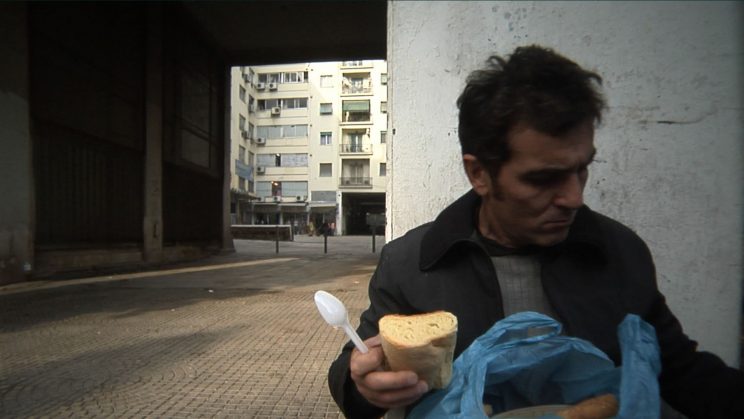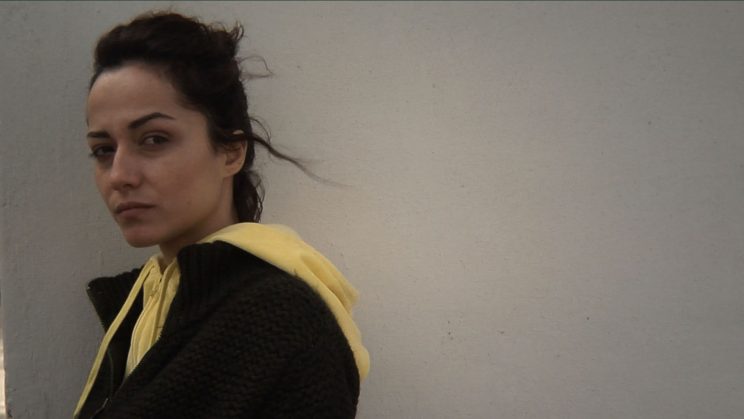Interrogating the shifting identities of immigrants and their haters, Correction (Thanos Anastopoulos, 2007) has a documentary style handheld cinematography in its depiction of migration as a current socio-cultural as well as economic phenomenon. It focuses on two characters; an Albanian immigrant and an ultra-nationalist Greek in Greece. The main protagonist Yorgos’ ‘destruction’ of an Albanian person implies the destruction of his own identity and potentially future, which represents the leitmotif of actions in the film. Correction is nearly ten years old, the story is set in Greece and revolves around the shifting identity of a previously xenophobic Greek man after freeing from prison while he searches for his Albanian wife, but the film’s narrative and its matching aesthetics are both timeless and spaceless.
In terms of its narrative, Correction is timeless in the sense that it depicts how immigrants and/or refugees face hostile welcome in their new countries. Correction shows the fragile ethnic balance in Greece, especially in people’s relation to the ‘Muslim’ or ‘Less-Western’ communities such as the Albanian and Turkish. The constitutive role of public events in consolidating the Greek identity is the central theme of the film, such as football games, which seemingly increase the ethnic tensions between these ‘allegedly’ antagonistic communities. Even when the film deals with a social and cultural problem in Greece, Correction is also spaceless in the sense that this problem is an intrinsic component of nearly all societies in different scope or formats, especially in the current ‘refugee crisis’ era.
As expressions of national aesthetics, the film’s tone is set through the repetitive use of national symbols and icons such as flags, national anthems, football games. As it is the case with many other Balkan films, the film does not rely on the extensive use of music. The only recurring sounds in the film are the diegetic Albanian lullaby, the national anthems and football songs and chants. When Yorgos shadows the Albanian woman, the almost fly-on-the-wall camera follows him throughout the film. The camera hides behind the protagonist when he gazes the restaurant that she works at. The camera moves even creepier when he follows the woman and her daughter on the streets. The real distance between Yorgos and the woman is sometimes so little, they can see and gaze each other from their present perspectives, especially when Yorgos stays in the empty space opposite to her house. At some points, the two ‘literally’ or ‘physically’ get closer, but they cannot pass their own boundaries, which are already determined by their pasts and national identities. These boundaries were bolstered by the use of fences, gates, doors and windows, which continually frame and separate the protagonist from other people in the film.
Other than depicting a case of ethnic violence, the film also succeeds in capturing the harsh economic reality of being an immigrant, especially a female immigrant. While being shadowed by her husband ( who is also the murderer of her own brother) all the time, with an aim to fix their relationship and see his daughter, the Albanian woman has to work for a restaurant as well working from home. The camera anxiously follows the woman while she sways between different work zones (her flat and the restaurant), as the city of Athens becomes a space where everyone attempts to survive/make ends meet.
After all, the avowed political statements of the film never turn out to be propaganda. As we hear the first hints of non-diegetic music at the end, almost as a surprising final addition, the ending does not resolve anything; it is far from providing a closure. In this way, the ending also does not provide a political agenda; Correction is quite consistent as it sticks to its observational tone and style. The open roads and the increasing distance between the Greek man and the Albanian woman might signify a better beginning for both of them as they are seemingly freer (especially from each other) or it might signify further ‘imprisonment’ for both (as they could not really have created peace and Yorgos gets lost in the chaos of the city in the last shot).


